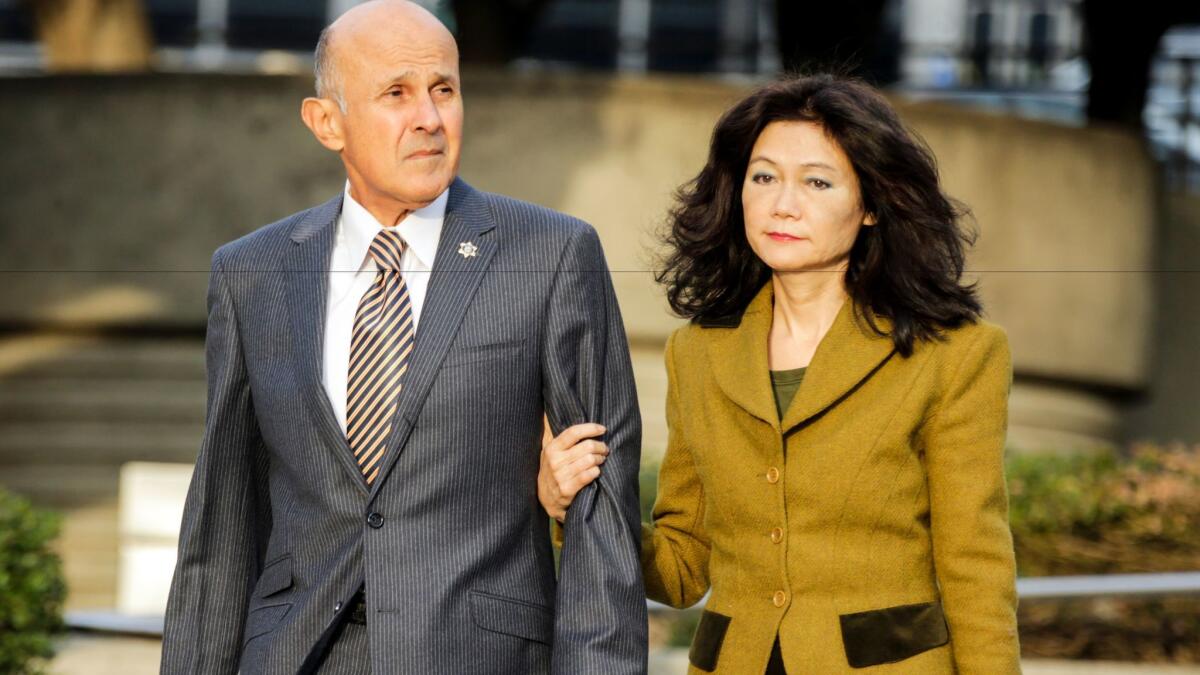‘No man is above the law,’ prosecutor tells jurors in closing arguments of Lee Baca’s obstruction of justice trial

- Share via
Lee Baca spent 15 years as sheriff of Los Angeles County building a reputation as an ethical and transparent leader with creative, progressive ideas on law enforcement.
But a federal prosecutor Monday took only 90 minutes to dismantle Baca’s glowing self-portrait and replace it with a far more sinister portrayal as the former sheriff’s obstruction of justice trial came to a close.
For the record:
12:43 p.m. Feb. 18, 2025Previous versions of this story misspelled the name of Lee Baca’s lead attorney as Nathan Hochmann. It is Nathan Hochman.
Assistant U.S. Atty. Brandon Fox delivered an unsparing closing argument to jurors, recapping nearly two weeks of testimony and evidence that he said prove Baca willfully participated in a 2011 plan to interfere with an FBI probe into widespread inmate abuse by deputies in county jails.
Fox presented Baca as a petty, territorial figure who “gave lip service” to repeated warnings about corrupt deputies working in his jails and then grew furious when he learned federal agents had launched a secret investigation into the problem.
Baca’s mindset, Fox said, was to “forget about the abused inmates, forget about the dirty deputies. Mr. Baca wanted to ensure that no outside law enforcement agency was going to police his jails.”
Nathan Hochman, Baca’s lead attorney, followed Fox and revisited the thrust of the defense’s case: That while Baca was upset with federal officials for keeping him in the dark about their investigation, he did not cross any legal lines. Baca, Hochman said, was unaware his trusted second in command, former Undersheriff Paul Tanaka, was leading a group of deputies to subvert the federal probe.
“The mere fact that Sheriff Baca was sheriff … does not make him criminally responsible for what went on down below,” Hochman said.
The claim of ignorance was attempted before by Tanaka, who was tried earlier this year on the same charges Baca now faces. He told jurors he had had no hand in the obstruction, which he blamed on Baca. Tanaka was convicted and sentenced to five years in prison. He is appealing the conviction.
Along with Tanaka, eight others from the department’s middle and lower ranks have been convicted or pleaded guilty in connection with the obstruction. Over six weeks in August and September 2011, after Baca learned of the FBI’s investigation, prosecutors allege the sheriff’s officials kept an inmate who was working as an FBI informant hidden from agents, pressured deputies and the informant not to cooperate with the investigation and tried to intimidate the lead agent in the case by threatening her with arrest.
Hochman disputed Fox’s claim that Baca was driven to act out of worry the FBI investigation would ultimately zero in on his failures to address the jail crisis. To the contrary, the attorney said, Baca had no motive to keep the FBI from investigating his jails because allegations about abusive deputies had been made for years and he had taken steps to correct the issue.
And far from throwing up obstacles in front of the FBI, Hochman said, Baca had wanted only to get information about what was going on in his jails and the identities of potentially corrupt and abusive deputies. He said the sheriff took action because he was being “stonewalled” by his federal counterparts.
Of particular concern to the sheriff, Hochman told jurors, was a sting operation FBI agents ran, in which a deputy was paid to smuggle a cellphone in to the inmate informant. Baca was worried the phone posed a serious safety risk and wanted to learn how it had been sneaked in, Hochman said.
In a rebuttal Fox gave as the trial’s final word, he said the defense was resorting to “fear mongering” by raising concerns about the possible dangers of a cellphone in jail. Whether or not the FBI conducted a well-run investigation was irrelevant to the obstruction case, he said.
After the closing statements, the jury began deliberating in private. A guilty verdict on the two felony charges of obstructing justice and conspiracy would almost certainly send Baca, who is 74 and in the early stages of Alzheimer’s disease, to federal prison for several years.
An acquittal would rehabilitate Baca’s legacy somewhat, although he faces another trial on an outstanding charge that he lied to federal officials about his awareness of the obstruction plan — also a felony.
Baca, who stepped down as sheriff in 2014 as the scandal engulfed the department, had tried to avoid ever putting his fate in the hands of a jury. Earlier this year, with the U.S. attorney’s office preparing to seek criminal charges against him, Baca struck a plea deal with prosecutors in which he would admit to a single charge of making false statements to investigators and avoid the more serious obstruction charges. Under the terms of the agreement, prosecutors agreed Baca would serve no more than six months in prison.
The deal fell apart, however, when U.S. District Judge Percy Anderson, who has handed down stiff sentences to the other sheriff’s officials convicted in the earlier trials, decided it was too lenient and made clear he intended to put Baca behind bars for a longer time. Baca opted to take his chances at trial.
As he did throughout the trial, Baca remained expressionless Monday as he listened to Fox and Hochman work to sway jurors with their widely divergent explanations of his role in the events.
Fox highlighted episodes that, he said, pointed to Baca’s involvement and complicity. In one, Tanaka ordered a subordinate to talk to Baca in order to explain how jail deputies managed to allow FBI agents to meet with the inmate informant despite orders that such interviews needed approval from high-ranking sheriff’s officials. The subordinate later reported to others that Baca had accepted his apology.
Such a conversation would make sense only if Baca was aware of efforts to keep the informant away from the federal agents, the prosecutor told jurors.
Fox also pointed out that Baca did not balk when then U.S. Atty. Andre Birotte called him to demand an explanation as to why sheriff’s deputies had approached the lead FBI agent at her home and threatened her with arrest over the smuggled phone.
And Fox returned to phone records and work calendars to show that Baca was present for meetings when the plan to derail the FBI investigation was hatched and remained in close contact with Tanaka as it unfolded.
Hochman tried to downplay the significance of the records, emphasizing that the conversations could have been to discuss any number of issues Baca dealt with as the head of the department’s sprawling operation.
In more than 100 emails presented by prosecutors as evidence of the obstruction plot, Baca was only directly involved in two, Hochman said. And while Tanaka was exchanging dozens of calls with the subordinates charged in the case, Baca was only on one call. Hochman accused prosecutors of “throwing some spaghetti against the wall to see if anything sticks against Sheriff Baca.”
“Mr. Baca doesn’t get to choose who’s investigating him, the manner or the way they investigate him,” Fox parried. “No man is above the law.”
For more news about the obstruction of justice trial of former Los Angeles County Sheriff Lee Baca, follow us on Twitter: @joelrubin and @vicjkim
ALSO
Man sentenced to life in prison for 1992 killing of his wife in ‘hired hit’ at La Mirada park
Responding to Trump, L.A. creates $10-million legal defense fund for immigrants facing deportation
Judicial panel clears California judge who gave lenient sentence in Stanford sexual assault
UPDATES:
4:25 p.m.: This article was updated with additional details from closing arguments and background about the obstruction case.
This article was originally published at 12:50 p.m.
More to Read
Sign up for Essential California
The most important California stories and recommendations in your inbox every morning.
You may occasionally receive promotional content from the Los Angeles Times.












